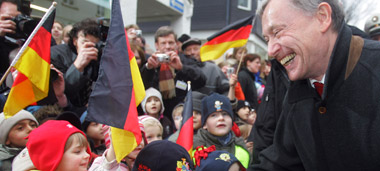In his regular meetings with party leaders in recent weeks, Köhler has been assured of widespread support for his candidacy, Bild reported on Saturday, citing government and party insiders.
Köhler himself said that he would only seek a second term if he had support from across the political spectrum. Merkel, who heads the conservative Christian Democratic Union (CDU), and Guido Westerwelle, head of the liberal Free Democrats (FDP) already gave Köhler the nod before Easter.
Even the Social Democrats, who supported their own candidate, Gesine Schwan, in the 2004 presidential election, have recently signalled their willingness to keep Köhler in office.
If he is indeed confirmed in office in May 2009, the majority of Germans should be pleased. According to polls, around 75 percent of Germans would welcome the prospect of another five years of Köhler as their largely symbolic head of state.
Köhler has not yet officially confirmed his candidacy – the former head of the International Monetary Fund said he would only do so about a year in advance of the election date of May 23, 2009.



 Please whitelist us to continue reading.
Please whitelist us to continue reading.